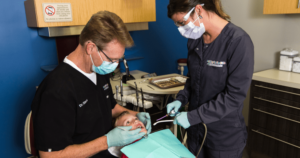Help! Useful Tips for Infrequent Flossers.
According to the American Dental Association, nearly 20% of Americans never floss. Many people invariably view flossing as optional which causes it to become one of the most frequently neglected parts of any oral care routine. But as much of a plaque fighter that your toothbrush is, it simply cannot reach all the tight spots between your teeth. Only floss is adept at getting to all the areas where bacteria hide. Here are a few ideas for those of us who find it difficult to floss:
Learn how to floss.
Flossing can be confusing for those who don’t do it regularly. The good news is that it’s not hard to learn. The American Dental Association’s website has very good instructions on how to floss and has even put together a one page .pdf to teach you how! You can download it here.
If you find flossing difficult, try floss holders.
Whether from large fingers or a lack of dexterity, some people simply have difficulty with the mechanics of flossing even after learning to do it the right way. Floss holders have become increasingly popular and are a great alternative for anyone who might find flossing difficult. Plus, holders made specifically for smaller mouths are great for children or adults helping with their child’s daily oral care.
Consider waxed floss.
Occasionally floss can become frayed, shredded or broken. This is often caused by teeth that are very close together. You might consider using waxed floss or floss made from polytetrafluoroethylene, a substance that is extremely slick. Shredded floss can also be caused by teeth that are broken or have cavities. If this is the case, don’t put off your next appointment!
Make flossing a priority.
Instead of making flossing a “once-in-a-while” task, consider establishing a routine of flossing. This will help you get in the habit of truly taking care of your teeth and gums.
It’s important to understand that flossing is just as important as brushing, that it isn’t optional and that it’s not too late to develop a healthy habit.


